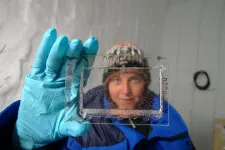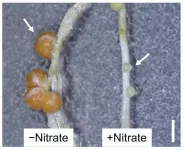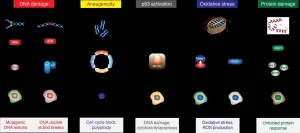(Press-News.org) Experts have uncovered a new molecular reason why faecal transplants are highly effective in treating infections such as C. difficile (a nasty bacteria that can infect the bowel), which could lead to more targeted treatments for this and other similar diseases.
The study, published today in Gastroenterology, was led by experts from the University of Nottingham and Nottingham Trent University.
Clostridium difficile, also known as C. difficile or C. diff, is a bacterium that can infect the bowel and cause diarrhoea. The infection most commonly affects people who have recently been treated with antibiotics. It can spread easily to others.
A stool transplant - or to give it its full title "a faecal microbiota transplant" (FMT) - aims to repopulate the patient's gut with the microbes from a healthy person, making it a successful therapy against C. diff and other similar diseases. An FMT is only considered if a patient suffers recurring bouts of the infection or has not responded to traditional treatments. FMT is effective in at least 80% of cases in treating the condition.
After a poo "sample" is produced, it is mixed with water. There are two routes for getting the sample into the required location in the bowel - down through the mouth straight into the stomach, or as a colonoscopy, up through the rectum.
Whilst the technique is highly effective in treating the infection, little is still known about how it does so. In this new study, a team of experts set out to understand how FMT works at a molecular level.
Dr Tanya Monaghan, Clinical Associate Professor, Honorary Consultant in Gastroenterology, and Anne McLaren Fellow in the School of Medicine at the University of Nottingham, and co-lead author of the research said: "It is not fully understood how an FMT works at a molecular level. That is a problem because if we knew how it worked at this level, then we could refine the treatment, which would mean a full transplant may not be needed."
The team used blood samples from two clinical FMT trials which were undertaken in Canada by co-lead Dr Dina Kao (University of Alberta) and collaborator Prof Christine Lee (University of British Columbia). From these data, they could see that following successful FMTs, there were alterations in patient microRNAs in the blood.
MicroRNAs are a class of short non-coding RNA molecules. With more than 2,000 microRNAs discovered in humans to date, many of them have already been implicated in common human disorders.
Dr Christos Polytarchou, Associate Professor in the School of Science and Technology at Nottingham Trent University, and co-author of the research, said: "MicroRNAs are characterised as master regulators of gene expression. A single microRNA can modulate multiple RNA and protein molecules, affecting a vast array of cell functions."
The researchers wanted to specifically look at whether microRNAs changed following a successful FMT.
The team, which also included investigators from the universities of Vanderbilt (Prof Borden Lacy and Dr Nick Markham) and Clemson (Dr Anna Seekatz), discovered that following successful transplant, there was an increase in specific microRNAs in the blood, which resembled similar changes also seen in the human and mouse intestine.
Dr Polytarchou added: "We found that C. diff utilises its toxins to highjack the molecular mechanism important for microRNA maturation, a process important for microRNA activity. We went on to identify specific microRNAs, which contribute to disease pathogenesis."
The team then looked at whether or not the combination of specific microRNAs could protect bowel cells from the damage that is induced by toxins from the bacteria, and they could.
Dr Monaghan said: "We have discovered a new mechanism by which the transplants work, which will now help us to develop a new method of therapeutics, which specifically target microRNAs. MicroRNA-based drugs are already being investigated to treat cancers, heart abnormalities, and kidney disease, but this is the first time microRNAs have been looked at as a means to treat C. diff infections. If used with antimicrobials, microRNA drugs could be extremely effective in treating C. diff and potentially other diseases"
INFORMATION:
New York, NY (April 9, 2021) - Sets of genes associated with resistance to immunotherapy in patients with metastatic urothelial cancer of the bladder have been identified and validated by researchers at Mount Sinai. In a study published in Clinical Cancer Research, the team uncovered gene signatures representing adaptive immunity and pro-tumorigenic inflammation that were responsible for sensitivity or resistance to immune checkpoint inhibitors, drugs that help the body's immune system recognize and attack cancerous cells.
"These findings enabled us to identify potential biomarkers in patients who are less likely to respond favorably to immune checkpoint inhibitors, as well as new combination therapeutic approaches that might overcome such resistance ...
Nine out of ten Danes say that they will accept the COVID-19 vaccine when offered. This is the same level as before the AstraZeneca vaccine was paused.
This is shown by a questionnaire-based survey collected by Søren Dinesen Østergaard and co-authors. He is professor at the Department of Clinical Medicine at Aarhus University and affiliated with the Department of Affective Disorders at Aarhus University Hospital, Psychiatry.
"In February 2021, we asked a sample of Danes whether they were willing to be vaccinated against the coronavirus, and 89 per cent replied that they would. This picture was unchanged when the same people were asked again after the pausing of the AstraZeneca vaccine," says Søren Dinesen Østergaard. ...
Throughout the last ice age, the climate changed repeatedly and rapidly during so-called Dansgaard-Oeschger events, where Greenland temperatures rose between 5 and 16 degrees Celsius in decades. When certain parts of the climate system changed, other parts of the climate system followed like a series of dominos toppling in succession. This is the conclusion from an analysis of ice-core data by a group of researchers that included postdoc Emilie Capron and associate professor Sune Olander Rasmussen from the Section for the Physics of Ice, Climate and Earth at the Niels Bohr ...
Tsukuba, Japan - Plants in the bean family (legumes) form nodules on their roots to take up nitrogen. Legumes will stop nodule production when nitrogen is plentiful (Figure 1), but precisely how nitrate presence controls nodule formation in these plants has been a mystery. Now, researchers from Japan have found that interactions between proteins and nitrate can induce and repress genes, controlling nodulation with potential applications in sustainable agriculture.
In a study published in April in The Plant Cell, a research team from the University of Tsukuba has shown that the different DNA-binding properties between proteins that establish nodule development determine if genes involved in symbiosis that govern nodulation turn on or off and that ...
Two studies led by the Mental Health Unit of the Virgen del Rocio University Hospital and involving researchers from the US conclude that antipsychotic drugs could have a protective effect against SARS-CoV-2. For this reason, patients treated with these drugs have a lower risk of becoming infected or suffer a milder form of the disease if they do become infected.
Thus, a first descriptive epidemiological study of a sample of 698 patients treated with antipsychotics at the Seville hospital revealed that antipsychotic drugs could provide protection against both infection and the tendency to clinical severity of Covid-19 infection. "These are very interesting findings that reflect a clinical reality where we see few patients ...
Since the beginning of the coronavirus pandemic, scientists and physicians worldwide undertook enormous efforts to understand the disease caused by the virus. In their latest collaborative study, researchers from the Max Planck Institute of Immunobiology and Epigenetics in Freiburg and physicians from the University of Freiburg Medical Center unveil a novel feature of COVID-19 immunity, which could have implications for future therapies. The study points to the involvement of Interleukin 33, an important danger signal, when immune cells encounter Sars-CoV-2 for a ...
An international group of scientists led by the RIKEN Cluster for Pioneering Research have studied the chemical composition of 50 protoplanetary-disk forming regions in the Perseus Molecular Cloud, and found that despite being in the same cloud, the amounts of complex organic molecules they contain are quite different. Interestingly, the chemically rich young disks have similar compositions of organic molecules. These findings raise an important question: do solar-like systems share a common chemistry at birth?
It was once believed that complex organic molecules were rare in the universe, and that this rarity ...
Imperial Brands scientists have utilised Toxys' ToxTracker suite of stem-cell based in-vitro assays, which provide mechanistic insight into the potential DNA damaging properties of chemicals, comparing vape e-liquid samples and their aerosols to combustible cigarette smoke.
Imperial scientists are the first to publish results using the ToxTracker system for the assessment of vape e-liquids and aerosols, and it forms part of the company's continuing research into the tobacco harm reduction potential of Next Generation Products (NGPs) such as vapes.
The assays help assess how product samples may impact cellular functioning across six reporter cell lines, picking up the tell-tale molecular signs of potential harm in the ...
Glass is ubiquitous, from high-tech products in the fields of optics, telecommunications, chemistry and medicine to everyday objects such as bottles and windows. However, shaping glass is mainly based on processes such as melting, grinding or etching. These processes are decades old, technologically demanding, energy-intensive and severely limited in terms of the shapes that can be realized. For the first time, a team led by Prof. Dr. Bastian E. Rapp from the Laboratory of Process Technology at the Department of Microsystems Engineering at the University of Freiburg, in collaboration with the Freiburg-based start-up Glassomer, has developed a process that makes it possible to form glass easily, quickly and in almost any shape using injection ...
The unpopular guests are already here. Hazel-, alder- and elm tree pollen sweep in over us during the early spring months, with birch pollen following in May. Then grass follows in June-July before mugwort pollen closes the season in late summer. All leading to more and more people suffering.
Over fifty years, the proportion of young Danes who sneeze, rub itchy eyes or suffer a blocked nose because of pollen has grown from 7-8 per cent in the 1970s to 24 per cent today. And for asthma, the proportion has risen from 4 to 12 per cent during the same period. ...




